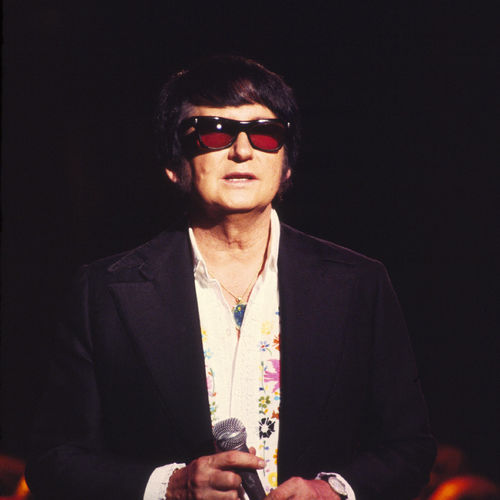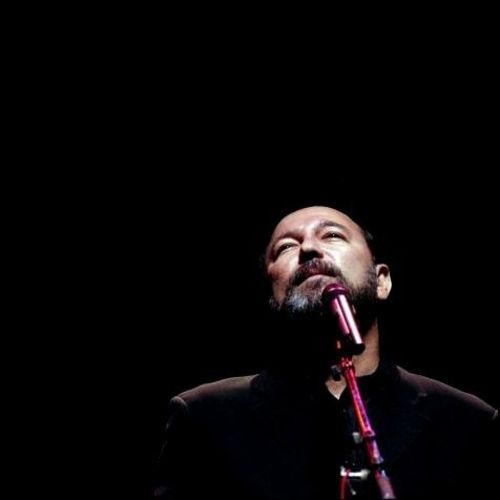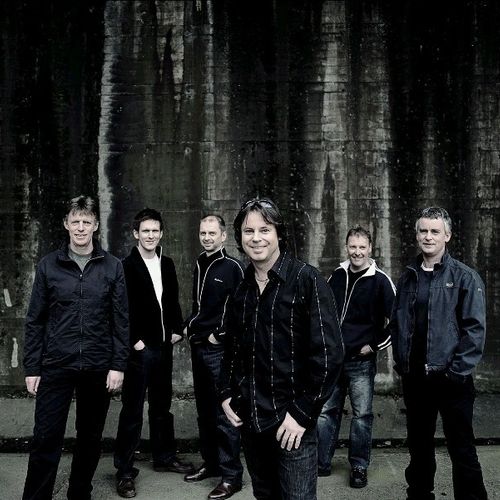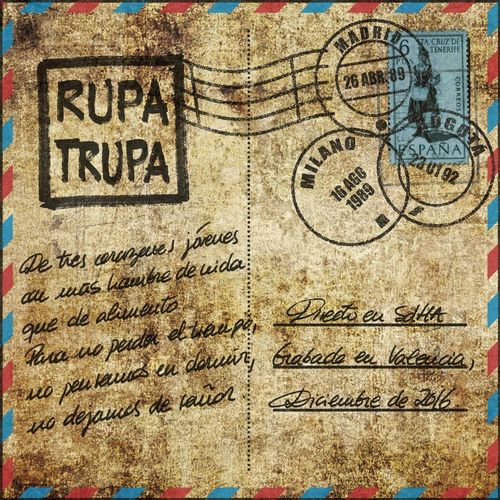
Biography:
Roy Kelton Orbison (April 23, 1936 – December 6, 1988), nicknamed "The Big O", was an influential American singer-songwriter and a pioneer of rock and roll, whose recording career spanned more than four decades. By the mid-1960s Orbison was internationally recognized for his ballads of lost love, rhythmically advanced melodies, three-octave vocal range, characteristic dark sunglasses, and sometimes distinctive usage of falsetto, typified in songs such as "Only the Lonely, "Oh, Pretty Woman", and "Crying".
Read more on Last.fm

Other songs:
- Blue Angel
- Blue Bayou
- Crying
- In Dreams
- Mean Woman Blues
- Oh, Pretty Woman
- Only The Lonely
- Pretty Woman
- Shadaroba
- Shes A Mystery To Me
- Sweet Dreams Baby
- You Got It
- A Love So Beautiful
- A Mansion On The Hill
- A True Love Goodbye
- Actress
- Afraid To Sleep
- After All
- After The Love Has Gone
- All By Myself
- All I Can Do Is Dream You
- All I Have To Do Is Dream
- All I Need Is Time
- Almost
- Almost Eighteen
- Amy
- An Empty Cup
- Beaujolais
- Beautiful Dreamer
- Belinda
- Best Friend
- Big As I Can Dream
- Blue Avenue
- Blue Blue Day
- Blue Rain Coming Down
- Blue Suede Shoes
- Blues In My Mind
- Born To Love Me
- Borne On The Wind
- Break My Mind
- Breakin Up Is Breaking My Heart
- Breaking Up Is Breaking My Heart
- Bye Bye Love
- California Blue
- California Sunshine Girl
- Candy Man
- Cant Forget
- Careless Heart
- Changes
- Cheyenne
- Circle
- Claudette
- Close Again
- Clown
- Cold Cold Heart
- Come Back To Me
- Coming Home
- Communication Breakdown
- Crawling Back
- Cry
- Cry Softly Lonely One
- Cryin
- Crying Time
- Dance
- Danny Boy
- Darkness
- Defeated
- Devil Doll
- Domino
- Double Date
- Dream
- Dream Baby
- Drifting Away
- Easy Way Out
- Empty Walls A Lonely Room
- Evergreen
- Falling
- Far Far Away
- Flowers
- Fools Hall Of Fame
- Forgive Me
- Friday Night
- Go Away
- Go Go Go
- Good Morning Dear
- Good Time Party
- Goodnight
- Growing Up
- Harlem Woman
- Heading South
- Heartache
- Heartbreak Radio
- Heavy Load
- Here Comes That Song Again
- Here Comes The Rain Baby
- Hey Miss Fanny
- Hound Dog Man
- House Without Windows
- How Are Things In Paradise
- How Do You Start Over
- Hung Up On You
- I Can Read Between The Lines
- I Cant Help It If Im Still In Love With You
- I Cant Stop Loving You
- I Dont Really Want You
- I Drove All Night
- I Get So Sentimental
- I Give Up
- I Like Love
- I Never Knew
- I Was A Fool
- I Was The One
- Id Be A Legend In My Time
- If I Had A Woman Like You
- If Only For A While
- If You Cant Say Something Nice
- Ill Never Tell
- Ill Say Its My Fault
- Im A Southern Man
- Im Hurtin
- Im In A Blue Blue Mood
- Im So Lonesome I Could Cry
- In The Real World
- Indian Wedding
- Inseparable
- It Aint No Big Thing
- It Takes All Kinds Of People
- It Takes One To Know One
- It Wasnt Very Long Ago
- Its Lonely
- Its Over
- Its Too Late
- Its Too Soon To Know
- Jenny
- Jolie
- Just Let Me Make Believe
- Lana
- Last Night I Heard You Crying In Your Sleep
- Leah
- Let Me In
- Lets Make A Memory
- Life Fades Away
- Lillian
- Loneliness
- Lonely Heart
- Lonely Wine
- Lonesome Number One
- Losing You
- Love Hurts
- Love In Time
- Love Me Like You Did Last Night
- Love Star
- Love Storm
- Lovestruck
- Loving Touch
- Mama
- Maybe
- Mean Little Mama
- Medicine Man
- Memories
- Memphis Tennessee
- Movin
- My Friend
- My Prayer
- Never
- Night Owl
- Nite Life
- No Chain At All
- No Ill Never Get Over You
- No One Will Ever Know
- Oh Pretty Woman
- Oh Such A Stranger
- One More Time
- One Of The Lonely Ones
- Only Alive
- Only With You
- Only You
- Ooby Dooby
- Paper Boy
- Party Heart
- Penny Arcade
- Pistolero
- Plain Jane Country
- Pledging My Love
- Precious
- Pretty One
- Pretty Paper
- Problem Child
- Raindrops
- Remember The Good
- Ride Away
- Rita
- River
- Rock House
- Rockhouse
- Running Scared
- Sad Eyes
- Say Youre My Girl
- Seems To Me
- Shahdaroba
- She
- She Cheats On Me
- She Wears My Ring
- She Wont Hang Her Love Out On The Line
- Shy Away
- Singing The Blues
- Sleepy Hollow
- So Good
- So Young
- Sooner Or Later
- Southbound Jericho Park
- Spanish Nights
- Spring Fever
- St Louis Blues
- Still
- Sugar And Honey
- Sugar Love
- Summer Love
- Summer Song
- Sunset
- Sweet And Easy To Love
- Sweet And Innocent
- Sweet Caroline
- Sweet Mama Blue
- Sweet Memories
- Tears
- Tennessee Owns My Soul
- That Lovin You Feeling
- The Bug
- The Cause Of It All
- The Clown
- The Comedians
- The Crowd
- The Fastest Guitar Alive
- The Loner
- The Morning After
- The Only One
- The Way Is Love
- There Wont Be Many Coming Home
- Therell Be No Teardrops Tonight
- They Call You Gigolette
- This Is My Land
- This Kind Of Love
- This Little Bird
- Time Changed Everything
- Time To Cry
- Todays Teardrops
- Too Soon To Know
- Truly Truly True
- Try To Remember
- Trying To Get To You
- Twenty Two Days
- Twenty
- Twinkle Toes
- Two Of A Kind
- Under Suspicion
- Up Town
- Uptown
- Valley Of The Roses
- Velveteen Doll
- Wait
- Walk On
- Wedding Day
- Well Take The Night
- Whatd I Say
- Where Have All The Flowers Gone
- Where Is Tomorrow
- Whippoorwill
- Whirlwind
- Wild Hearts
- Wild Hearts Run Out Of Time
- Windsurfer
- Wings Of Glory
- With The Bug
- Wonderful You
- Wondering
- Words
- Working For The Man
- Yes
- Yesterdays Child
- You Fool You
- You May Feel Me Crying
- You Win Again
- Youll Never Be Sixteen Again
- Youll Never Walk Alone
- Youre Gonna Cry
- Youre My Baby
- Youre The One
Four years of hard work!This month of May we celebrated four years on the air. We continue working on the dissemination of this wonderful instrument, thank you for participating in our story!
After The Love Has Gone
C# F# C#
When love's light slowly starts to fade.
F# G#
On dreams and promises we made.
C# F# C#
What can we do to right this wrong.
F# G# C#
After the love, after the love has gone.
When did our love began to die.
It seems too late to wonder why.
This feeling seems so strong.
After the love, after the love has gone.
Chorus #1:
C# Bbm G#
After the love has gone.
C# Bbm G#
How can we still be friends.
C# Bbm G#
How can we carry on.
F# G# C#
After the love, after the love has gone.
And now it's time to say goodbye.
Just walk away, try not to cry.
We'll love again before too long.
After the love, after the love has gone.
After the love has gone.
After it finally ends.
There'll be no sweet love songs.
Chorus #1
by: José Duarte
[email protected]
C# F# C#
When love's light slowly starts to fade.
F# G#
On dreams and promises we made.
C# F# C#
What can we do to right this wrong.
F# G# C#
After the love, after the love has gone.
When did our love began to die.
It seems too late to wonder why.
This feeling seems so strong.
After the love, after the love has gone.
Chorus #1:
C# Bbm G#
After the love has gone.
C# Bbm G#
How can we still be friends.
C# Bbm G#
How can we carry on.
F# G# C#
After the love, after the love has gone.
And now it's time to say goodbye.
Just walk away, try not to cry.
We'll love again before too long.
After the love, after the love has gone.
After the love has gone.
After it finally ends.
There'll be no sweet love songs.
Chorus #1
by: José Duarte
[email protected]










